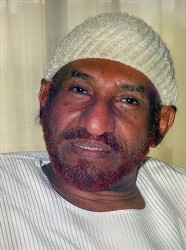Sudan’s NUP leader describes 2015 elections as “nightmare”
July 28, 2014 (Khartoum) – The leader of Sudan’s opposition National Umma Party (NUP), al-Sadiq al-Mahdi, has described the government intention to hold elections in the country under the present circumstances as a “nightmare”.

He said the only resolution issued by the United Nations Security Council (UNSC) concerning Sudan before the current regime assumes power was resolution 112 which was adopted in 1956 and admitted Sudan’s membership in the UN, adding that the UNSC issued 61 resolutions against Sudan mostly under chapter seven under the regime of president Omer Hassan al-Bashir.
The former prime minister added that Sudan ranked the 6th most corrupt country in the world in 2013 according to Transparency International’s corruption index, saying in 2013 Sudan ranked third on the list of the world’s failed states, after the Democratic Republic of Congo (DRC) and Somalia respectively.
He also noted that Sudan is ranked 172 out of 180 countries on Reporters Without Borders’ press freedom index in 2014, pointing that Sudan took the rear among 143 countries in the 2014 Global Innovation Index which ranks countries according to the level of development of innovative technologies, institutions, human capital, scientific research, infrastructure, and market development.
Al-Mahdi stressed that continuation of the regime means that the same people who carried out policies which led to the current situation would continue to hold to power, pointing the government call for elections is not intended to rotate power but to echo actions of the Middle East tyrants.
He underscored that such elections would only allow the ruling party to hold power because it controls government institutions, resources and the media.
“Whatever failures of the regime, elections would be similar to that which is being held in Syria under president Asad, Iraq under president Sadam, Egypt under president Mubarak, Yemen under president Ali abdallah and Tunisia under Zain al-Abdin Bin Ali. The late Iraqi poet, Ahmed Matar, described these types of elections as “a nightmare standing before me,” he added.
Sudan’s opposition parties call for forming a transitional government and holding a national conference with the participation of rebel groups to discuss a peaceful solution for the conflicts in Darfur region, South Kordofan and Blue Nile states.
The interim government would organise general elections once a political agreement on constitutional matters is reached, inaugurating a new democratic regime. But the ruling National Congress Party (NCP) rejects this proposal saying opposition parties must simply prepare for the 2015 elections and that rebels should sign first peace accords.
The NUP leader further affirmed that holding elections under the present circumstances is nothing but an absurd move, saying it would exacerbates the country’s crises.
He pointed to the possibility of overthrowing the regime through armed action but warned the move would repeat the Syrian scenario if it failed to seize power or could lead to establishing another dictatorial government if it managed to topple the regime.
He said that popular uprising requires a widespread popular movement, political strike and military intervention in the final stage.
“As was the case in the Sudan and Arab Spring states, this integration [of the three requirements] is possible but it would more probably be a result of a coincidence not a plan,” he added.
Al-Mahdi saw that the alternative option is that all political, civil and armed forces agree on a new regime which would achieve just and comprehensive peace and the full democratic transformation, vowing to continue efforts to bring all these forces together.
He addressed the government saying that Sudan is currently under unprecedented international trusteeship as per the UNSC resolutions under chapter seven, as well as the presence of more than 30,000 foreign troops in its territory and the population’s significant dependence on international aid.
The opposition leader said there is no way to remove these obstacles in light of the continuation of the current situation.
ISLAM AND TERRORISM
Al-Mahdi also saw that many Muslims carry out some practices which hurt Islam such as a ruler who declares implementation of Shari’a with his main focus on punishment or a political group which announces establishment of an Islamic regime only to exercise corruption and tyranny.
He wondered how Islam’s reputation could get hurt by actions of some Muslims who sentenced a woman to flogging and death when she was eight months pregnant.
The NUP leader was alluding to the case of Meriam Ibrahim, the 27-year old Christian woman who was sentenced to death by hanging in May after refusing to recant her faith and return to Islam, but was later released after what the government described as “unprecedented” international pressure.
He further considered measures taken by the so called the Islamic State of Iraq and Syria (ISIR) against Christians such as imposing Jizya (protection tax) on them besides discrimination against women a proof that some Muslim actions hurt Islam.
The NUP leader said the west played great role in finding Islamic groups such as Al-Qaeda and ISIR, suggesting holding international conference in order to reflect the true Islamic discourse.
He warned that the Arab world would pay a huge price if it failed to fight against extremism and violence because the phenomenon surpasses national boundaries.
(ST)
